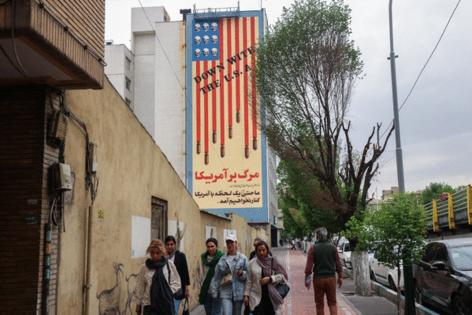Commentary: Trump administration takes the first diplomatic step with Iran over nuclear program
Published in Op Eds
For the first time in about a decade, senior U.S. and Iranian officials met face to face. Last Saturday, Steve Witkoff, the U.S. envoy to the Middle East, and Iranian Foreign Minister Abbas Araghchi held a round of negotiations on a subject that has been a source of contention for the two archnemeses for more than two decades: Tehran’s nuclear program.
The aim? To determine whether enough common ground exists to continue diplomacy toward an agreement that would restrain Iran’s nuclear activities in exchange for U.S. sanctions relief, an arrangement that sounds quite similar to the very deal President Donald Trump withdrew from during his first term.
The talks went as well as anybody could expect. U.S. and Iranian officials are used to talking past each other. This time, they used Oman as a mediator to shuttle positions back and forth. Witkoff and Araghchi had a short meetup at the end of the day, something that wouldn’t have occurred if the two didn’t think there was a basis for moving forward. Both sides made certain that their respective readouts were upbeat. Iran state media said the first round was held in a “constructive atmosphere based on mutual respect.” The White House referred to the discussions as “very positive and constructive.” The second round will reportedly take place in Rome this Saturday.
Washington and Tehran both have reasons for keeping the process on track. The Islamic Republic is at one of its most precarious moments since the Iran-Iraq War in the 1980s. The Iranians are exposed, and they know it. Iran’s decades-long policy of strategic depth, in which Tehran funded, armed and organized proxy militias in countries around Israel, is at death’s door. Hezbollah, once Iran’s most formidable nonstate ally, is still licking its wounds from a devastating war with Israel last year, in which thousands of its fighters were killed, its top leadership was decimated, and its stock of drones and missiles depleted. Hamas is hemmed in within an ever-shrinking part of Gaza as Israeli forces construct new security corridors there and expand their buffer zones. Syria, once Iran’s only state ally in the Middle East, is no longer under its thumb.
None of this even begins to account for Iran’s economic troubles. Inflation is above 30%, prices are astronomically high and the Iranian middle class is finding it more difficult to afford the basics. There is also a growing divide between the Iranian political elite and the people they are supposed to represent. At times, the octogenarians in positions of power seem remarkably detached from what’s actually happening on the ground, and as evidenced during the 2022-23 protests, Iran’s younger generations are fed up with what they consider archaic social strictures.
The United States wants a deal as well, albeit for different reasons. Although Iran’s strategic position is weaker than it was this time last year, the Iranians have accelerated their uranium enrichment efforts, installed more (and better) centrifuges and have limited the oversight of international inspectors. Iran now has enough enriched uranium for six nuclear warheads, although building an actual warhead would take months. Trump, who campaigned on ending wars rather than starting new ones, prefers talking to bombing. Sure, he boasts about the military option incessantly for the cameras, but Trump wouldn’t be green-lighting negotiations in the first place if he viewed bombing as the most effective policy.
Even so, there are constituencies who view diplomacy as akin to appeasement. Conservative and ultra-conservative elements in the Iranian political establishment may be old, but they don’t forget. It was only seven years ago when Trump pulled Washington out of the Joint Comprehensive Plan of Action (JCPOA), the President Barack Obama-era nuclear deal that was supposed to pump some much-needed life into the Iranian economy in return for strict, verifiable limits on Tehran’s nuclear work. Iran’s supreme leader, Ayatollah Ali Khamenei, reminds Iranians about this episode constantly, and we don’t need to read between the lines to understand his message: The United States is a duplicitous snake that strikes deals one day and discards them the next. The Islamic Revolutionary Guard Corps, whose power perhaps exceeds the clerics’ own, also remembers that time in January 2020 when Trump authorized the targeted killing of its top general, Qasem Soleimani, and this elite branch of the Iranian armed forces has never gotten over it.
Moreover, Israeli Prime Minister Benjamin Netanyahu is dead set against any agreement that doesn’t include Tehran’s full capitulation. Netanyahu, who was in office when the Obama administration successfully negotiated the JCPOA, is an avid Iran hawk and has always preferred bombing over talking, presumably because talking would inevitably include concessions to the Iranians he couldn’t stomach. Netanyahu’s version of a good deal is Khamenei doing what the late Moammar Gadhafi did back in 2003-04: giving up his entire weapons of mass destruction program. Gadhafi died seven years later as his regime came tumbling down courtesy of a U.S.-backed campaign against him. Israeli media are reporting that Israeli officials are concerned about what concessions Trump might make in these talks and are privately rooting for their collapse.
Yet if Trump is truly interested in striking a nuclear accord with Tehran, concessions will be absolutely necessary. While this is obvious, it’s surprising how many policy elites seem to think Washington can just use overwhelming pressure over a weaker party to get it wants. But the United States tried this during Trump’s first term and got the opposite of what it wanted — more Iranian enrichment, more Iranian centrifuges, more Iranian aggression and less international access to the Iranian nuclear program. Compliance failed. Negotiations still have a chance to succeed.
____
Daniel DePetris is a fellow at Defense Priorities and a foreign affairs columnist for the Chicago Tribune.
___
©2025 Chicago Tribune. Visit at chicagotribune.com. Distributed by Tribune Content Agency, LLC.




























































Comments